
Facebook is launching another investigation into Russian interference ahead of the Brexit referendum in 2016.
In a letter to the chair of the digital, culture, media and sport (DCMS) committee, Damian Collins, Facebook’s UK policy director Simon Milner said its investigatory team is looking into “coordinated activity around the Brexit referendum” carried out by suspected Russian clusters that was not identified previously.

Access deeper industry intelligence
Experience unmatched clarity with a single platform that combines unique data, AI, and human expertise.
The whole saga around Russian interference in Brexit has focused mainly on the social media networks, Facebook and Twitter. In particular, Facebook has been accused of not doing enough to investigate the issues of fake news and the Brexit referendum.
What do we actually know about suspected Russian intrusion in Brexit via Facebook?
Back in November, Facebook officially agreed to cooperate with the DCMS committee investigation into Russian meddling. The Mark Zuckerberg-owned company was asked to disclose whether any ads were bought by Russian-linked accounts relating to Brexit in the months leading up to the June referendum.
The DCMS committee didn’t have to wait long. In December, Facebook revealed that only 73p had been set on Russia ads during the two months prior to the EU referendum campaign vote. The Internet Research Agency, a known Russian propaganda operation, reportedly paid for the ads, which were seen a total of 200 times.
Collins was not happy about the results. He said:

US Tariffs are shifting - will you react or anticipate?
Don’t let policy changes catch you off guard. Stay proactive with real-time data and expert analysis.
By GlobalData“It would appear that no work has been done by Facebook to look for Russian activity around the EU referendum, other than from funded advertisements from those accounts that had already been identified as part of the US Senate’s investigation.”
He demanded that Facebook investigate other fake accounts and pages that could be linked to Russia backed agencies.
What is the situation now?
It appears that Facebook has agreed to cooperate with Collins’ demands for a further investigation. In the letter, Milner said:
“We are committed to making all reasonable efforts to establish whether or not there was coordinated activity similar to that which was found in the US and will report back to you as soon as the work has been completed.”
He added that the work will take a number of weeks to complete.
Collins responded to Milner’s letter, saying:
“I look forward to seeing the results of this investigation, and I’m sure we will want to question Facebook about this when we know the outcome.”
Unfortunately for Facebook, it doesn’t have a number of weeks. MPs from the DCMS committee are visiting Washington D.C next month as part of the inquiry into fake news.
The committee will hold public evidence sessions at the British embassy in the US capital to quiz social media companies. So far, representations are confirmed from Google, YouTube and the executive vice president and managing director of CNN International.
The DCMS committee has recently confirmed that representatives from Facebook and Twitter will be at the Washington D.C public evidence sessions. Milner will be appearing for Facebook, alongside Monika Bickert, the company’s head of global policy management.
For Twitter, Carlos Monje, the director of public policy and philanthropy in the US and Canada will be appearing. As well, his his equivalent in the UK, Nick Pickles, will also be attending.







